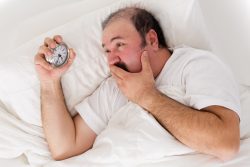 New research has found that quite the opposite is true. Previously a growing body of research has suggested that a poor quality of sleep is linked to an increased risk of obesity through deregulating appetite which results in higher caloric consumption. However, the latest study actually shows a flip side to that suggesting obesity leads to poor sleep. It isn’t the loss of sleep that leads to obesity, but instead it is excess weight that can lead to poor sleep.
New research has found that quite the opposite is true. Previously a growing body of research has suggested that a poor quality of sleep is linked to an increased risk of obesity through deregulating appetite which results in higher caloric consumption. However, the latest study actually shows a flip side to that suggesting obesity leads to poor sleep. It isn’t the loss of sleep that leads to obesity, but instead it is excess weight that can lead to poor sleep.
It is thought that sleep is a function of the body trying to conserve energy where energetic levels are going down. The recent studies findings suggest that if a person were to fast for a day, they would get sleepy because their energetic stores would be depleted.
In humans, acute disruption of sleep can result in an increase in appetite and also insulin resistance. People who chronically get less than 6 hours of sleep per night are more likely to be diabetic and obese. However, starvation in rats, worms, fruit flies and humans has been shown to affect sleep which indicates that it is regulated at least in part by the availability of nutrients. However, the ways in which eating and sleeping work in tandem has been unclear.
The study team wanted to know what is sleep actually doing? Short periods of sleep and other chronic conditions such as diabetes, are linked but it is just an association. It isn’t clear if short sleep is causing the propensity for obesity or instead that the obesity itself causes the propensity of short sleep.
To research the association between sleep and metabolism, the team genetically altered C elegan worms to turn off a neuron that controls sleep. These worms could still breathe, eat and reproduce, but lost their ability to sleep. With the neuron disabled, the team saw a severe drop in adenosine triphosphate (ATP) levels which is the body’s energy currency.
In earlier research, a gene in C elegans called KIN-29 was studied. This particular gene is homologous to the Salt Inducible Kinase (SIK-3) gene found in humans. This gene had already known to promote sleep pressure. When the researchers knocked out the KIN-29 gene to promote sleepless worms, the mutant C elegans amassed more fat which resembles the human condition of obesity, although their ATP levels were decreased.
The team hypothesized that releasing fat stores is a control by which sleep is encouraged and the reasons KIN-29 mutants could not sleep was because they were not able to release the fat. By testing this, the team again manipulated the KIN-29 mutant worms by releasing an enzyme that discharged their fat. Because of this manipulation, once again the worms were able to sleep.
The team said this could explain a reason why people who are obese may experience sleep problems. There may be a signaling problem between the brain cells that control sleep and fat stores.
There is still much to unravel about sleep, however the new research provides a step closer to understanding sleep’s core functions and how to treat common sleep disorders. There appears to be a common overarching sentiment within the sleep field that sleep is all about the brain or the nerve cells. The new work suggests that may not be true. There are complex interactions between the brain and the rest of the human body that connects to regulation of sleep.
To view the original scientific study click below
A salt-induced kinase is required for the metabolic regulation of sleep.





